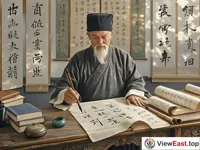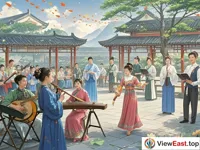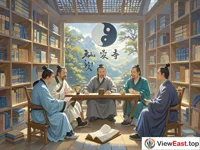





In the vast family of the Chinese nation, the Han Chinese stand out as the most populous and historically ancient ethnicity, shining with a unique brilliance. The origin and early development of the Han Chinese carry the wisdom and creativity of the Chinese nation, exerting a profound influence on the national ethos of China.
Origin: The Legends of Yan and Huang
The origin of the Han Chinese can be traced back to the ancient tribes of Yan and Huang. Emperors Yan and Huang, two great leaders, are regarded as the progenitors of the Han Chinese. They thrived and multiplied along the Yellow River, initiating the preface to Huaxia civilization. Over time, the Han Chinese continuously integrated with surrounding ethnic groups, gradually growing and strengthening, forming a diverse yet unified ethnicity.
Early Development: The Rise of Agricultural Civilization
The early Han Chinese primarily developed an agricultural civilization, characterized by their diligence and intelligence in cultivating land and growing crops. The fertile lands of the Yellow River provided exceptional conditions for the agricultural development of the Han Chinese, allowing them to live in peace and create abundant material wealth. At the same time, the Han Chinese accumulated rich experience and knowledge in agricultural production, inventing many advanced agricultural tools and technologies, such as the plow and water wheel, making significant contributions to the development of Chinese agriculture.
Cultural Achievements: The Birth of Chinese Characters and Art
In terms of culture, the early development of the Han Chinese also achieved remarkable accomplishments. The invention of Chinese characters is one of the significant hallmarks of Han Chinese culture; it is not only a system of writing but also a crystallization of the wisdom of the Chinese nation. The evolution of Chinese characters reflects the Han Chinese people's understanding and contemplation of the world, possessing rich connotations and unique artistic charm. Additionally, the early culture of the Han Chinese included various forms of art such as poetry, music, dance, and painting. The "Book of Songs" is the first anthology of Chinese poetry, recording the lives, emotions, and thoughts of the Han Chinese people at the time, possessing immense literary value. Music and dance also held an important position in early Han Chinese society, often used in rituals and celebrations to express reverence for the divine and aspirations for a good life.
Philosophical Thoughts: Confucianism, Taoism, Legalism
The traditional philosophical thoughts of the Han Chinese have also profoundly influenced the ethos of the Chinese nation. Philosophical schools such as Confucianism, Taoism, and Legalism gradually took shape during the early development of the Han Chinese and significantly impacted various aspects of Chinese society, including politics, economy, and culture. Confucian thought emphasizes "benevolence, righteousness, propriety, wisdom, and faithfulness," advocating for governing the country with a heart of love and regulating people's behavior with etiquette, playing a crucial role in the stability and development of Chinese feudal society. Taoist thought advocates "following the natural way," emphasizing the harmonious coexistence of humans and nature, positively influencing the ecological concepts in traditional Chinese culture. Legalist thought emphasizes governing the country by law, focusing on the authority and practicality of the law, providing an important theoretical basis for the construction of ancient Chinese political systems.
Technological Achievements: The Birth of the Four Great Inventions
In terms of technology, the early development of the Han Chinese also achieved many accomplishments. The ancient Han Chinese invented papermaking, printing, gunpowder, and the compass, collectively known as the Four Great Inventions, which made significant contributions to the development of world civilization. The invention of papermaking and printing made the dissemination of knowledge more convenient, driving the development of human culture; the invention of gunpowder changed the nature of warfare, profoundly influencing the course of world history; the invention of the compass provided crucial technical support for the development of navigation, promoting exchanges and cooperation among nations around the world.
Conclusion
The origin and early development of the Han Chinese are an essential part of the history of the Chinese nation, showcasing the diligence, wisdom, and creativity of the Han Chinese people, and exerting a profound influence on the national ethos of China. The rich and profound culture of the Han Chinese not only provides a strong spiritual impetus for the development of the Chinese nation but also makes significant contributions to the progress of world civilization.